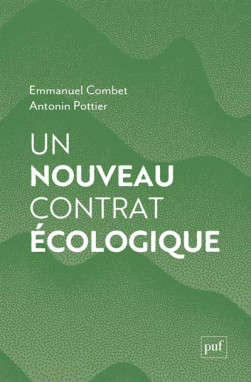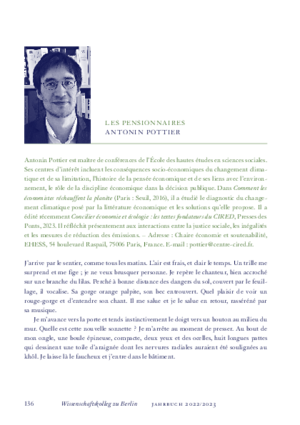
Antonin Pottier, Dr.
maître de conférences
École des hautes études en sciences sociales, Paris
Born in 1984 in Tours, France
Studied Mathematics and Physics at the École Normale Supérieure and Economics at the École des hautes études en sciences sociales
Arbeitsvorhaben
“Power to Act,” a Practical Concept for the Climate Transition
The transition to low-carbon societies, a necessity to curb and stop climate change, raises formidable challenges. One, and not the least, is the possibility of making this transition while preserving and possibly enhancing social justice. The project aims at developing a concept of “power to act,” referring to people’s differential capacity to modify their way of living to reduce greenhouse gases emissions, a capacity rooted in possibilities offered by the social environment they live in. This concept conveys the fact that people always have an ability to behave and act differently than they actually do, so that GHG emissions are reduced. The “power to act” is a relational concept that links an emission of GHG to an agent that has the ability to make it not happen. From the point of view of emissions, it points to the agents who can act on them; from the point of view of agents, it points to the emissions they have the most power to reduce.The concept of “power to act” thus seems well suited to tackle several difficulties identified in the current conversation about climate transition and social justice. For example, instead of imposing a constant carbon price, irrespective of the “power to act” of the actors, such a policy targeting the emissions on which agents have the “power to act” could probably lead to less social disturbance. It can also be viewed in a dynamic way: public policies could be set to increase agents’ “power to act” (such as developing public transportation) to further reduce emissions in a second stage, and more easily.
The intuition guiding the project is that the concept of “power to act” has the potential to reframe these issues and several others.
Recommended Reading
Pottier, Antonin. Comment les économistes réchauffent la planète. Paris: Seuil, 2016.
Pottier, Antonin, Emmanuel Combet, Jean-Michel Cayla, Simona de Lauretis, and Franck Nadaud. “Who Emits CO 2? Landscape of Ecological Inequalities in France From a Critical Perspective.” FEEM Working Paper 014.2021, Fondazione Eni Enrico Mattei, Milan, 2021. https://www.feem.it/m
/publications_pages/ndl2021-014.pdf. French: “Qui émet du CO2? Panorama critique des inégalités écologiques en France.” Revue de l’OFCE, no. 169 (2020): 73–132.
Pottier, Antonin. “Expenditure Elasticity and Income Elasticity of GHG Emissions: A Survey of Literature on Household Carbon Footprint.” Ecological Economics 192 (2022): 107251. https://doi.org/10.1016/j.ecolecon.2021.107251.
Kolloquium, 21.02.2023
Wie die Wirtschaftswissenschaften immateriell wurden
Die Welt steuert gerade auf einen katastrophalen Klimawandel zu. Die Unfähigkeit, ihn trotz jahrzehntelanger Warnungen zu verhindern, wirft Fragen darüber auf, wie unsere Gesellschaften funktionieren. Diese Fragen betreffen auch das Wissen, das diese Gesellschaften hervorgebracht haben: Warum waren wir nicht in der Lage, die bevorstehenden Zerstörungen zu sehen, zu erkennen oder einzuschätzen? Warum glauben wir, dass Umbrüche in der Natur kaum gesellschaftliche Auswirkungen hätten? Welche Art von Wissen hat Gesellschaften gedanklich von den Geschehnissen in ihrer natürlichen Umwelt isoliert? Wie wird die Unsichtbarkeit des Zusammenwirkens von natürlicher und sozialer Welt produziert und konstruiert?
Ich stelle mein Projekt vor, in dem ich mich auf ökonomisches Wissen in diesem breiten Kontext konzentriere. Dabei setze ich bei den beträchtlichen Schwierigkeiten der Wirtschaftswissenschaften im Umgang mit dem Klimawandel an. Indem ich die lange Geschichte der Vernachlässigung von Umweltproblemen durch die Wirtschaftswissenschaften zurückverfolge, will ich Erklärungen für die gegenwärtige Situation bieten. Dazu ziehe ich Materialien aus der wirtschaftswissenschaftlichen Literatur der letzten zwei Jahrhunderte heran. Ich gehe den Wendungen ökonomischer Paradigmen nach, vergleiche, wie verschiedene Ökonominnen und Ökonomen an dieselbe Frage herangegangen sind, und untersuche einige Theoriedebatten. Anhand dieser Positionen, an denen ich beobachte, wie die Beziehung zwischen Wirtschaft und Umwelt gefasst wurde und wird, zeige ich, wie Umwelt, Natur und die materielle Grundlage von Gesellschaften allmählich vergessen und als zulässige Forschungsgegenstände disqualifiziert wurden. Diese Entwicklung steht in engem Zusammenhang damit, dass die Wirtschaftswissenschaften als Disziplin autonom werden. Im Bildungsprozess eines Wissens, das gegenüber anderen Arten des Wissens über soziale und natürliche Welten autonom ist, haben die Wirtschaftswissenschaften auch ihre Bindung an die Materialität abgeworfen – sie sind immateriell geworden. Genau jene Gegenstände, die heute dringend erforscht werden müssen, sind bei der Errichtung des ökonomischen Wissens allmählich verworfen und an den Rand gedrängt worden.
Publikationen aus der Fellowbibliothek
Pottier, Antonin (Paris, 2024)
Pottier, Antonin ([S.l.], 2021)
Who emits CO2? Landscape of ecological inequalities in France from a critical perspective FEEM Working Paper ; No. 14.2021
Pottier, Antonin (Paris, 2020)
Qui émet du CO2? : Panorama critique des inégalités écologiques en France
Pottier, Antonin (Paris, 2020)
Faire l'économie de l'environnement Sciences sociales
Pottier, Antonin (Bassum, 2018)
A climate damage on production or on growth : what impact on the social cost of carbon?
Im Kolleg entstanden 29.05.24
Köpfe und Ideen 2023
Fahrradfahren reicht nicht
ein Porträt von Antonin Pottier von Gerald Wagner



